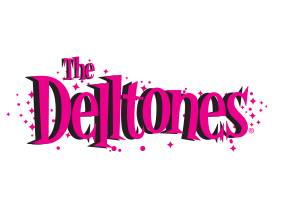History
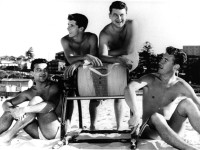 It is a remarkable affection which Australia has for the indefatigable Delltones, an entity which has been a part of our lives through not just a phase of rock ‘n’ roll but pretty much its entire span.
It is a remarkable affection which Australia has for the indefatigable Delltones, an entity which has been a part of our lives through not just a phase of rock ‘n’ roll but pretty much its entire span.
Rock ‘n’ roll wasn’t supposed to last. It was fast, trashy and disposable. Its protagonists, metaphorically and sometimes literally, lived fast, died young and left a good-looking corpse.
Those which did survive the initial, blistering impact of rock ‘n’ roll plainly possessed something that their audience was not content to let slip away, be it an irresistible sound, a presence, or a personality. Only a few had all three.
Australia knew that it loved the Delltones in 1958, when the four young lifesavers, Noel Widerberg, Brian Perkins, Warren Lucas and Ian ‘Peewee’ Wilson, appeared gawky, gangly and hopeful at the Bronte Surf Club, then in Australian stadium ‘Big Shows’ with mentor Johnny O’Keefe, on pioneering radio show Rockville Junction and television shows Six O’Clock Rock and Bandstand, and finally on record with their debut top twenty hit, the Crows’ doo wop standard Gee.
The Delltones were part of a burgeoning rock ‘n’ roll environment which largely invented itself; part of a community which drew guitar patterns on Fantales boxes in darkened cinemas, ran sprawling suburban dances with pug nosed boxers as bouncers, blew international touring acts off stage with raw, blustery energy, and gleefully upset the social order of a young and conservative country.
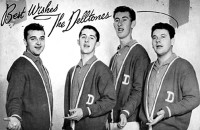 Young, fresh and enthusiastic, with creamy harmonies punctuated by the booming bass tones of the almost cartoonlike Ian ‘Peewee’ Wilson, the Beanpole of Bop, the Delltones were humorous, entertaining and irrepressible, able to light up a stage or a television screen. And, at least in the very early days, it all seemed to just fall in their laps. “We were a vocal group with simple harmonies,” Peewee recalls. “We would walk around Sydney’s streets and at the right place suddenly launch into a doo wop song. That was how we got our first gig; a restaurant manager heard us and booked us. Payment was a plate of spaghetti bolognaise and a beer each.”
Young, fresh and enthusiastic, with creamy harmonies punctuated by the booming bass tones of the almost cartoonlike Ian ‘Peewee’ Wilson, the Beanpole of Bop, the Delltones were humorous, entertaining and irrepressible, able to light up a stage or a television screen. And, at least in the very early days, it all seemed to just fall in their laps. “We were a vocal group with simple harmonies,” Peewee recalls. “We would walk around Sydney’s streets and at the right place suddenly launch into a doo wop song. That was how we got our first gig; a restaurant manager heard us and booked us. Payment was a plate of spaghetti bolognaise and a beer each.”
“Johnny O’Keefe was instrumental in giving the band the opportunity to appear in front of large audiences and the opportunity to observe and learn stagecraft, which just came naturally to him. Initially we only had a repertoire of five songs yet we were playing to up to 15,000 kids at Sydney Stadium as vocal backing support for U.S. stars like the Everly Brothers, Fabian, Conway Twitty, Crash Craddock and Jimmy Rodgers. We even landed our own three song spot in each of the concerts.” One of the American visitors Tommy Sands’ guitarist, Scotty Turnbull and legendary drummer Hal Blaine liked the group so much they found time between shows to record a single with them called Little Miss Heartbreak, released by EMI’s HMV imprint.
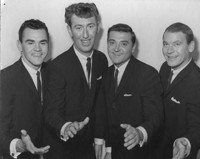 “It was just incredible,” says Peewee. “We chucked in our jobs and we were just 18! We thought we would have a good time for a year or so and then all be back on our day jobs. We didn’t look at it as a career. Like all young guys it was as much about chasing women and drinking beer as anything else; an attitude of gather rosebuds while you can.”
“It was just incredible,” says Peewee. “We chucked in our jobs and we were just 18! We thought we would have a good time for a year or so and then all be back on our day jobs. We didn’t look at it as a career. Like all young guys it was as much about chasing women and drinking beer as anything else; an attitude of gather rosebuds while you can.”
But it wasn’t destined to be quite that momentary. Signed to Lee Gordon’s record company they were regularly on the charts into 1961 when the Coronet snapped them up briefly, storming into the top five with You’re The Limit. Back on Leedon in 1962 they released a slickly produced country-pop hit, Get A Little Dirt On Your Hands, which was to be the last recording made by lead vocalist Noel Widerberg before his tragic death in a car accident. With encouragement from family and friends and with new lead singer Col Loughnan (later an integral part of Ayers Rock) they released Leiber & Stoller’s, Come A Little Bit Closer, both songs making the top three. By the end of 1963, they reinvestigated their Bronte Surf Club origins and transformed themselves into the nation’s premier surf sound act, topping charts with Hangin’ Five, written by a Sydney detective and surfer Ben Acton, which made them a household name.
“We spent most of our time on Bronte. We surfed all day and sang at night, life was simple. As long as we had a car to drive around in and lots of girls and beer we were happy. We never really made any money then but no one cared. Appearances counted for a lot. In those days you just had to have a manager, even though they cost you a lot of money and didn’t do much for you. It was a matter of prestige” says Peewee.
Like so many other popular acts of the 50s and early 60s, the Delltones found themselves swept aside by a tidal wave from Britain. “The Beatles changed our whole career, mid-stream, when they came along” Peewee admits. After scraping into the top forty with a version of the Tams’ Hey Girl Don’t Bother Me in 1964 they found themselves off the charts and out on the road, working very hard to make a living. Not that it was ever really a chore. “In the 60s we never cared if we never went back home; on the road it was one big long party,” says Peewee. “We indulged in pretty basic fun. Our lifesaving ties gave us a clean community image but we pursued girls and booze with an almost chauvinistic vengeance.”
Not that there wasn’t a deep-seated passion for the music that had swept them up and their generation. “The roots of what we were doing was rhythm & blues – I’ve always loved black vocal groups,” Peewee said recently. “And it suited me. I mean, with my style of voice it was going to be doo wop or opera! We were greatly influenced by a vocal group The Diamonds, who were actually white, but they sounded black.”
Always blessed with a great aura and a sense of dynamics you couldn’t kill with a rake, the Delltones took themselves off around this vast continent and then to New Zealand and other overseas destinations – most memorably, Vietnam. Peewee recalls, “It was a wild time. We were naive boys in a foreign country racked by war, which we saw as some kind of adventure. We did up to four shows a day, some of them on the back of lorries, with a war happening up the road. We weren’t afraid, although we should have been. I think that was because none of us really understood what was going on.”
By the end of their first decade, the group had recorded 18 singles and five albums in Australia, played on every known television show, featured in every known publication and got their chops down so well live that no audience ever left in any state below enchantment. Their home base, mainly in clubs and cabarets, was secure and their household name status was still very much in place. But it was a time when Australian groups were almost ritually heading off to England to try their fortune.
The Bee Gees, Seekers and Easybeats had actually made it, though a score of others had endured a London winter in a coldwater bedsit before dragging their weary carcasses back home to throw themselves on the mercy of their old audience.
At the end of 1969 the Delltones with the recently joined members Sep Martin and Bob Pierse joined the lemming’s rush to London and by early 1970 were in residence at London’s Playboy Club in the West End. “That was heaven for me” Peewee once told Rolling Stone magazine. “Landing in the centre of Playboy magazine was the ultimate fantasy for the boy from the surf club. So much that it overwhelmed me. We did eight weeks there, two seasons.” The Delltones actually did better in the old Dart than many of Australia’s hot pop sensations who trod the same path. For starters, they got to record a whole album there – London Session, most of the songs written by former Delltone member Bob Pierse and the late Digby Richards, which now commands big bucks on the collectors’ market.
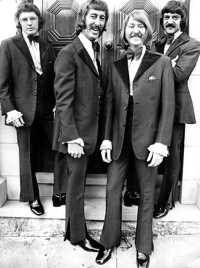 Resplendent in wide ties and drooping mustaches, they recorded what was hopefully described by EMI Records in London as a “new orgasm of sound”. The album was arranged and conducted by Bill Shepherd of Bee Gees fame and backed by Australia’s own Twilights, musically led by guitarist Terry Britten, who would late write global hits for Cliff Richard, Tina Turner and Michael Jackson. But even though their robust version of the Spencer Davis Group hit Gimme Some Lovin’ ,with exceptional vocals by Sep Martin (a BBC Radio One ‘hitpick’) generated enough interest from Capitol Records to be released in the U.S. and the group appeared on Top of the Pops with Black Sabbath, and played across Europe, in Italy, Germany, Norway, Denmark and Sweden, the jaunt lasted not much more than a year and ended with no great success.
Resplendent in wide ties and drooping mustaches, they recorded what was hopefully described by EMI Records in London as a “new orgasm of sound”. The album was arranged and conducted by Bill Shepherd of Bee Gees fame and backed by Australia’s own Twilights, musically led by guitarist Terry Britten, who would late write global hits for Cliff Richard, Tina Turner and Michael Jackson. But even though their robust version of the Spencer Davis Group hit Gimme Some Lovin’ ,with exceptional vocals by Sep Martin (a BBC Radio One ‘hitpick’) generated enough interest from Capitol Records to be released in the U.S. and the group appeared on Top of the Pops with Black Sabbath, and played across Europe, in Italy, Germany, Norway, Denmark and Sweden, the jaunt lasted not much more than a year and ended with no great success.
Even at home, things had moved on. It was the age of rock festivals and bands of stoned, hirsute musicians who gazed at their sandaled feet during twenty minute guitar solos. The Delltones came home and played a national tour, with less than their customary effervescence. “We found ourselves in limbo and out of step with the contemporary music scene at the time” explains Peewee. “We had lost contact with artistic development so it just seemed a natural thing to disband. “And so they did.
At the Playboy Club Peewee had met a beautiful Italian-born woman by the name of Carla Prowse who became his wife and, from 1972 to 1978, his partner in a grand hippie experiment. They purchased a fine swathe of land at Eungai Creek near Nambucca Heads and became farmers – serious ones. “We turned feral! It was a classic post-60s hippie dropout and a wonderful experience; we have priceless memories of the time” says Peewee now. “I had been a long while on the road and I had a disenchantment with the industry, city life and show business.” Peewee rejected offers to reform the band, even from Johnny O’Keefe, as he and Carla raised beans, melons, zucchini… and a couple of kids.
But the man who once said “performing is a drug” and, more recently, “I’m just into performing, its all I’ve ever known” knew somewhere in the back of his bucolic mind that one day he would have to return to his true craft. In 1979 he did reform the Delltones and went out on the road throughout New South Wales.
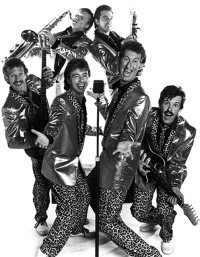 The spark was still there and the audience reaction a real revelation. “It dawned on me” he explains, “that as a farmer I would make a much better singer and there was a certain pressure arising from the state of the music industry. It was being said that if ever the Delltones came back, that would have to be the time, as revival music was booming.”
The spark was still there and the audience reaction a real revelation. “It dawned on me” he explains, “that as a farmer I would make a much better singer and there was a certain pressure arising from the state of the music industry. It was being said that if ever the Delltones came back, that would have to be the time, as revival music was booming.”
Certainly it was, with the Stray Cats and other rockabilly outfits kicking up a storm as the eighties began. The Delltones took advantage of that environment but, as tends to happen with reformations, the tensions and contentions which break up a band first time around are still there second time around. Realising the limits of a harmony ensemble in a live environment of tensile Oz Rock bands Peewee set about reinventing the venerable entity – changing it from vocal group to vocal band. That which came about is largely the unit that exists today.
By 1983 they had not only won their second Mo Award but had become so ‘cool’ with the smart set that they played a record 16 week run at Kinselas in Sydney’s Taylor Square in Darlinghurst, with a hip audience lapping up their energetic performance and Peewee’s basso profundo voice. They were even invited to play an anti-nuclear rally alongside Aboriginal band No Fixed Address and at the Tivoli with Mondo Rock. By the end of 1983 they had played 171 gigs and found time to record demos for what would be their first album in more than a dozen years.
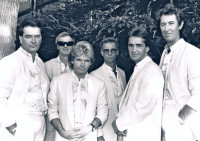 1984 kicked off with the joyful Bop Til Ya Drop album, with a garish pink and green jacked designed by renowned artist Martin Sharp (who once designed Cream album covers). It went gold almost immediately and only Michael Jackson’s Thriller kept it out of the number one spot on the Kent Album Chart. Having never had a real charting album, they were not overly disappointed with the second ranked slot!
1984 kicked off with the joyful Bop Til Ya Drop album, with a garish pink and green jacked designed by renowned artist Martin Sharp (who once designed Cream album covers). It went gold almost immediately and only Michael Jackson’s Thriller kept it out of the number one spot on the Kent Album Chart. Having never had a real charting album, they were not overly disappointed with the second ranked slot!
With a highly professional presentation and stage set-up and the never-diminishing allure of their instantly identifiable ‘Mr. Bassman’ The Delltones went out to their audience and blew them away, night after night after night. Line-ups changed but the essence of the appeal never did. Albums kept coming and kept selling – Tickled Pink, Out In The Open. At the end of 1985 Danny Mayers took a hiatus and Nevin McLean joined The Delltones. This added a new dimension to the vocal harmonies including their regular television performances. Keeping up a grueling touring schedule and in 1988 they recorded and released the Adventurous Oasis, a Doowop fusion album, that included some self penned tracks. The album failed to impress radio or their fans at live performances.
They played at Moomba, the Adelaide Festival, and the AFI Awards. They appeared in the soapie A Country Practice and Peewee played Yahoo Serious’ father in the film Young Einstein (he was even caricatured in Mad magazine, a true honor!). 1995 saw the return of Danny Mayers. They paid homage to their surf club roots with the album – The Sunshine Club- penning the title track along with -Gimme Love and Slow Down-. Ably managed since 1983 to the present day by Carla Wilson the actress who threw in her lot with Peewee all those years ago, they touched a wider range of Australians than almost any other rock group. They fearlessly strode into the jaws of any beast in their lam’e, pastels and leopard skins. The ‘new’ members were now old members, as integral as any who had been on board from day one. As Peewee puts it: “They soon got infected”.
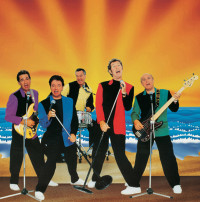 The long-beloved Delltones have been cited as one of the few real constants in a frantically changing world. Fifty years on, audiences still scream, audiences still shout, audiences still go away singing the songs, dancing the steps, chanting the goofy chants and looking forward to coming back for another dose as soon as they can. And not just original fans who’ve grown up with the band, all along the way, a new generation of fans kept coming on board. There are more than a few curious young, intrigued by the durability of this rock’n’roll institution, who are drawn by the power of a music that truly shook the world. “I don’t think we’d survive if we only had the old fans,” reasons Peewee. “The band has survived a lot of changes and that’s what makes it attractive to the audience.
The long-beloved Delltones have been cited as one of the few real constants in a frantically changing world. Fifty years on, audiences still scream, audiences still shout, audiences still go away singing the songs, dancing the steps, chanting the goofy chants and looking forward to coming back for another dose as soon as they can. And not just original fans who’ve grown up with the band, all along the way, a new generation of fans kept coming on board. There are more than a few curious young, intrigued by the durability of this rock’n’roll institution, who are drawn by the power of a music that truly shook the world. “I don’t think we’d survive if we only had the old fans,” reasons Peewee. “The band has survived a lot of changes and that’s what makes it attractive to the audience.
“Our sound is aimed at the heart and feet. I’ve always wanted to do music that reflected romance and humour”. The bottom line for the Delltones is entertainment and that has been recognised over the years with four Mo Awards and just recently four Ace Awards. “There’s still a sense of rebellion and youthfulness, but music is now so wide and so varied that happy good time rock’n’roll is hard to resist.” Certainly it is when delivered by the irrepressible, battle-hardened Dellies! “I’m very lucky indeed,” insists Peewee “I don’t know if I’ll ever be able to give this up. I think I’ll just trust the fans.
When they stop coming to our shows I will know without a doubt that it’s time! At this time, is there any other role for me in life? I couldn’t imagine doing anything else. I still get down to the surf, in fact I’m still a member of the Bronte Surf Club. Indeed the slogan was immortalised by Peewee in the 80s: ‘Keep Raging and Stop The Ageing,’ has entered the national vocabulary. While the Delltones themselves have entered international consciousness. The astounding Doo Wop treatment of the Sex Pistols’ punk classic Pretty Vacant which they recorded for the Musical Challenge section of Andrew Denton’s Triple M breakfast radio show in 2000 and which was released on a charity album has taken on a life of its own, not dissimilar to the reaction afforded Rolf Harris’ version of Stairway To Heaven. It is all over the www, having been picked up and played by independent radio stations and bloggers in England, Europe and America.
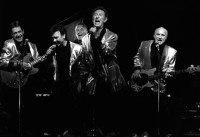 If there can be said to be such a thing as a last laugh then, a half a century on, the Delltones can be said to have had it. They have more than outlasted rock ‘n’ roll’s critics, cynics and doomsayers, providing us with an admirable example of the enduring power of the extraordinary hybrid music form that distilled the essence of what had gone before into a true life force; one which redefined popular culture.
If there can be said to be such a thing as a last laugh then, a half a century on, the Delltones can be said to have had it. They have more than outlasted rock ‘n’ roll’s critics, cynics and doomsayers, providing us with an admirable example of the enduring power of the extraordinary hybrid music form that distilled the essence of what had gone before into a true life force; one which redefined popular culture.
“When we first started in 1958” Peewee points out, “there was no local music industry and radio was mostly playing imported records so a lot of people were telling us that we might as well enjoy ourselves while we could because that music wasn’t going to last; rock ‘n’ roll was a passing fad which would soon disappear.”
In fact, the Delltones have never been more visible.
At the memorable benefit concert for the legendary Max Merritt at the St. Kilda Palais, where 60s, 70 and 80s icons rubbed shoulders and swapped notes, the Delltones represented the first decade and generation of Oz Rock with such vigor and charm that they were one of the half dozen acts highlighted (for their “highly polished harmonies”) alongside Joe Camilleri and Daryl Braithwaite in a review in The Age.
The Delltones have now been entertaining audiences, celebrating and elevating rock’n’roll for over 50 years. Ian “Peewee” Wilson founding member and the most recognisable Delltone, the tall bass man, has kept the band alive from the original vocal quartet days to the transformation to a five piece vocal band in the early 1980”s. Today the band has come full circle and has returned to their roots, to a four-part harmony band.
The Delltones represent tenacity and durability and those qualities do not go unnoticed by bands just beginning their career path. Chris Cheney of The Living End was asked the question by Insider magazine: Memories of the first concert you went to? “One of the first live bands I saw was The Delltones and it was just brilliant”
 In 2012 on behalf of The Delltones Peewee Wilson was proud and privileged to receive THE LIFE ACHIEVEMENT AWARD from the Australian Club Entertainment Awards.
In 2012 on behalf of The Delltones Peewee Wilson was proud and privileged to receive THE LIFE ACHIEVEMENT AWARD from the Australian Club Entertainment Awards.
The Delltones remain one of the most consistent live entertainers in Australia with arguably the longest performing and recording history for a vocal harmony band with an original member.
As long as “Peewee” is there, it’s The Delltones.
We would like to note our appreciation to Glenn A Baker, writer/rock historian, for his contribution to The Delltones History page.


